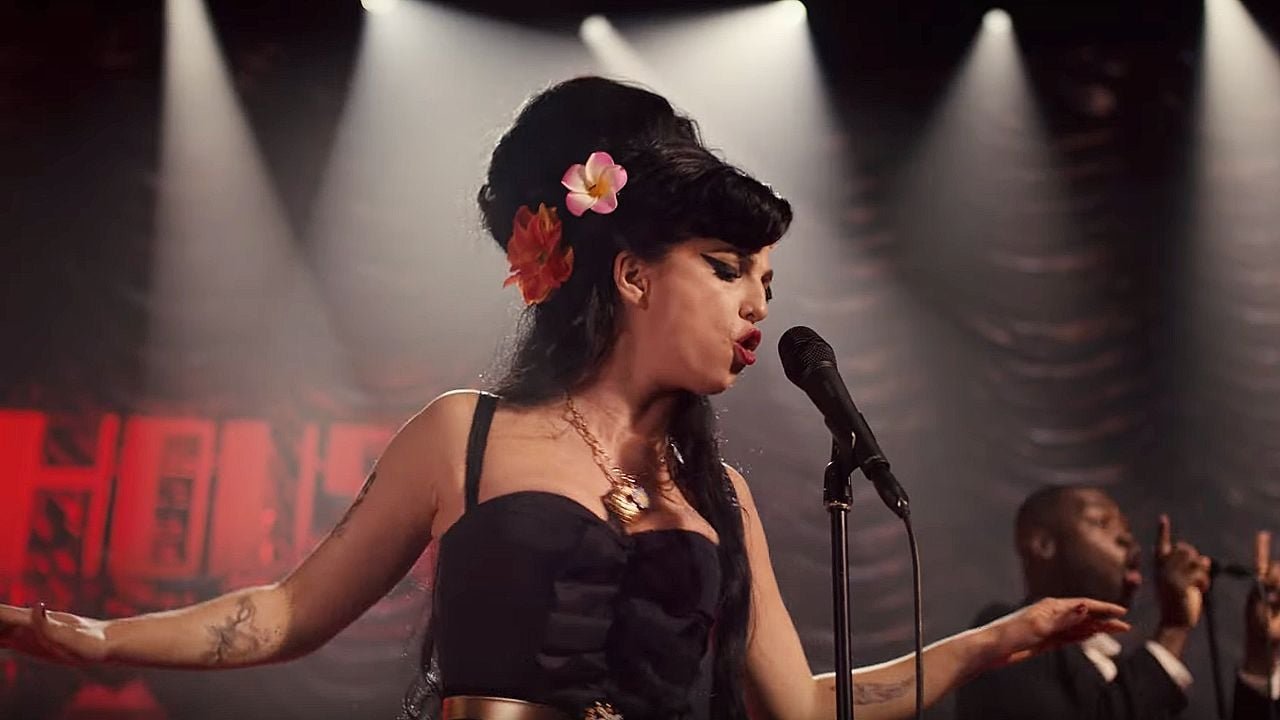“Back to Black” Review
Marisa Abela stars in “Back to Black” as music icon Amy Winehouse whose incredible performances, insightful writing and tragic death made her one of the most iconic artists of the 21st Century.
Here’s my big question in regards to “Back to Black”. Why would you want to make a cradle-to-grave biopic centered on Amy Winehouse when the 2015 documentary “Amy” already did just that and did well at the box office while winning the Oscar for Best Documentary Feature Film? I mean, I know why the studio would do it. Money. But from an artistic standpoint, what could be gained? Is it that audiences like a formulaic biopic over a documentary? If that’s the case then I’m starting to lose faith in the American filmgoing audience. “Back to Black” is yet another soulless biopic that, along with “Bob Marley: One Love” and “Whitney Houston: I Wanna Dance With Somebody”, demonstrates that something needs to change in the music biopic genre. Otherwise, it’s as good as dead.
Showing the story of Amy Winehouse (Marisa Abela), the film details her rise through the music industry and her many career highlights and personal troubles that led to critically acclaimed works like the titular sophomore album. In particular, “Back to Black” focuses on her tumultuous relationship with her husband Blake Fielder-Civil (Jack O’Connell) and her substance abuse problems that eventually would claim her life at the age of 27, cementing her status in rock martyrdom.
Before I tear into the film, which it has definitely brought down upon itself, I would like to point out a positive attribute that I don’t want to get lost in the shuffle: Marisa Abela’s performance. Like Kingsley Ben-Adir in “Bob Marley: One Love”, Abela does an admirable job showcasing Winehouse’s tenacity and musical talent while also bringing humanity to the scenes where she is in severe pain and turning to drugs to cope. It’s just that the script is giving her nothing to work with.
Like other mediocre biopics, the entire film feels like a soulless retelling of Amy Winehouse’s Wikipedia page. Instead of focusing on one particular time period in her life, “Back to Black” tries to cram way too much into the story and so no scene is allowed to breathe. We see Amy Winehouse but we don’t get to know her. And for being called “Back to Black”, the creation of her famous album is barely scratched. Her entire creative process is cast aside for dull melodrama that doesn’t come close to representing the real turmoil she went through.
Some of my favorite scenes in the film focus on the romance between Amy and Blake but even those feel sterile. This was a toxically codependent relationship that saw both parties push each other to the breaking point despite their love for each other and that would have been interesting to explore in a delicate way. But delicate exploration isn’t this film’s goal. It’s like “Back to Black” was trying to be “Sid and Nancy” but just didn’t have the gumption to go all the way. The entire thing feels like it was made just to capitalize on the name of Amy Winehouse but it’s so dull that I wouldn’t throw around a charged word like exploitative at the film. It’s not worthy of that adjective. Despite receiving similar accusations, at least “Blonde” took some memorably creative risks with the story of Marilyn Monroe. Whether they paid off depends on the viewer since the film was so polarizing but at least it left an impact.
What is especially frustrating is that the writer and director of this film, Matt Greenhalgh and Sam Taylor-Johnson respectively, have made great contributions to the music biopic genre in the past. Greenhalgh wrote the films “Control”, centered on Ian Curtis of Joy Division, and “Nowhere Boy”, which followed a young John Lennon and his life before The Beatles, with Taylor-Johnson directing the latter. Both of these people can do the genre quite well sO it’s hard to explain how a film about someone as iconic as Amy Winehouse fell this flat. Was it just an unfocused idea of what to do or was it studio interference? I don’t know and I don’t really care because the work isn’t even enough of a failure to elicit that strong of an emotion.
Droning on for two hours and never saying anything of value, “Back to Black” is just another film that shows that Hollywood will spend millions to create something cheap and flimsy for a momentary sense of financial success instead of something that will last forever. People are going to remember Amy Winehouse, her music and the documentary that so accurately reflected who she was as an artist and a person. This film is going to be quickly forgotten and thank God for that. As of now, I have very little confidence in the state of music biopics but maybe this will change. In the case of upcoming films focused on Bob Dylan and Bruce Springsteen, the premises and creative teams behind these projects do intrigue me but it’s not enough to convince me of their success. But as long as they can steer clear of the overused dramatic pitfalls that have dominated the past few biopics, I am cautiously hopeful. But when your film starts to feel like “Walk Hard: The Dewey Cox Story” but with none of the satirical comedy, you need to desperately rethink your narrative.


